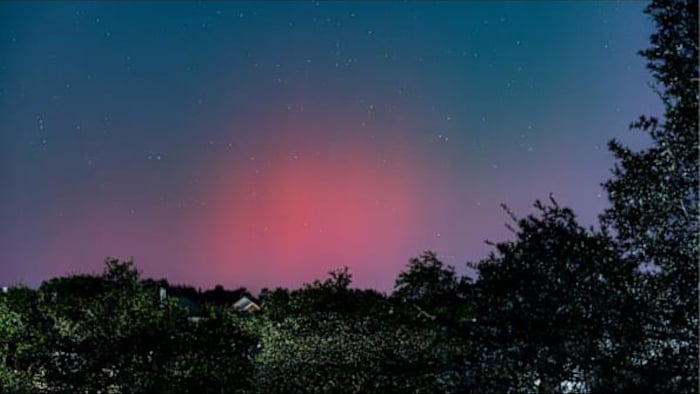UPDATE: G4 level geomagnetic storm measured, Aurora visible in South Texas through sunrise – Especially when viewed through camera phone (sensitive camera technology sees it better than human eye). Conditions constantly change, so look north periodically throughout the night.Key Points
-
Get away from lights
-
Look north
-
Look north through smartphone – cameras detect it better
-
Check back because conditions constantly change
-
AURORA VISIBILITY DEPENDS ON: Continuing solar activity and its interaction with Earth
-
Viewability changes throughout the night
-
Tech impacts are possible, but major disruptions are unlikely.
What is happening?
SAN ANTONIO – A coronal mass ejection (CME) is an outburst of solar material, plasma, and magnetic fields from the sun’s outer atmosphere. CMEs are common, but a particularly strong one was observed early Tuesday morning, November 11.
We don’t know the full scope of the CMEs until they reach our instrumentation to measure them, which is 1 million miles from earth. This happened around 3 a.m. CDT, according to the Space Weather Prediction Center (SWPC).
The SWPC expects geomagnetic activity to continue into Wednesday, November 12, so the aurora will likely be visible for some lower latitudes in the U.S. Wednesday night.
“A CME show was observed at 01:23 am EDT on June 1, 2025 at a spacecraft approximately 1 million miles from Earth, indicating the arrival of the anticipated Coronal Mass Ejection.
Geomagnetic field activity level is anticipated to remain disturbed throughout today into June 2nd as the storm evolves…”
Space Weather Prediction Center; Sunday, June 1, 2025
Will San Antonio see the aurora?
CMEs interact with the atmosphere and create the colorful aurora, also known as the “northern lights.”
It’s been an active solar season, and San Antonio briefly observed the northern lights in May 2024 and October 2024 from stronger waves of CMEs.
While visibility with the naked eye will be difficult, the cameras on our phones have sensitive equipment that can sometimes see the aurora when our eyes can’t, so there’s a *chance* your camera might detect it. But that’s IF solar activity continues arrives before sunrise Wednesday morning. Still, it’s worth a shot.
If you do capture anything, make sure to post it on KSAT Connect.
Technology impacts
There is a slight possibility of minor tech impacts, such as advanced GPS and satellite interruptions.
There’s a very slight chance some power grids could be impacted, but utilities have been informed of potential issues and can make necessary adjustments if needed.
BUT IT’S WORTH NOTING THAT NOT MUCH HAPPENED LAST YEAR WITH STRONGER CMEs.
The Weather Authority will keep the community updated with any changes or developments.
Community members can share their sky photos and videos through KSAT Connect.
Copyright 2024 by KSAT – All rights reserved.
